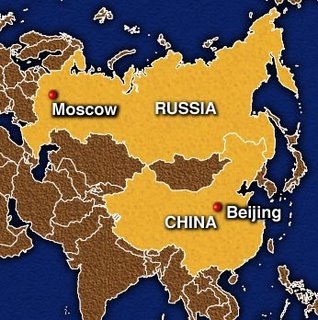 Eugene Trani was a Russian scholar before he became the President of Virginia Commonwealth University. It is therefore a country he is familiar with.
Eugene Trani was a Russian scholar before he became the President of Virginia Commonwealth University. It is therefore a country he is familiar with.He has a piece in today’s International Herald Tribune voicing concern about the United States’ failure to build a useful relationship with Russia. Russia has much to offer the U.S. from oil and gas to various kinds of help in the conflict with terrorist groups. While it is quite appropriate to be critical of the Putin regime for the move away from democracy and the heavy handed approach to Chechnya it does not make sense from a strategic point of view to give Russia the cold shoulder. The result could be to push Russia into a closer relationship with China that could have negative implications for American interests in the future.
Trani writes of his impressions and observations following a trip to Russia last summer ,
The Russia I visited was one of growing prosperity and innovation,You can read the entire article here.
progressive education and an economic strength not based exclusively on oil and
gas.
It was a Russia uniquely positioned to forge solid partnerships for the war
on terrorism, nuclear nonproliferation and energy - all vital issues for
America.
***
This sidestepping of America is apparent in … pivotal arenas. Russia has
taken an active interest in the expanding Chinese market, and in connecting its
security strategy to China's expanding power.
Russia is in a unique position, geographically and politically, to meet
China's rapidly growing demand for energy, natural resources and timber. And
China provides Russia with a ripe market for high-tech weapons.
In a 2005 article in the Beijing Review, the Russian ambassador to China,
Sergei Razov, wrote of bilateral relations with China as being "at the highest
level in history," citing their first joint military maneuvers and rapidly
growing trade, the volume of which exceeded $29 billion in 2005.
Razov also discussed the ten-fold increase in Chinese students in Russia
over the past decade - that when the number of Chinese students applying to U.S.
universities has drastically decreased.
Russia's deepening relations with China have already created alarming
vulnerabilities.
In 2005, Russia and China attempted to restrict access by the United States
and NATO to Central Asian air bases, despite the critical role of these bases
for military and humanitarian operations in Afghanistan - an effort that Russia
previously supported.
If the United States continues to criticize Russia, Russian-Chinese
relations over the next 10 years could lead to a regrouping of world powers and
possibly a new Cold War.
But if the United States moved to full engagement with Russia, it could
realize considerable policy and economic gains. For a model, America need look
no further than its foreign policy with China - like Russia, a nuclear-armed
nation with a long history of authoritarian government.
China also does not always play by America's rules. But while the State
Department recently announced sanctions against Russia for the alleged selling
of restricted items to Iran, the Department of the Treasury gave China only a
slap on the wrist in May over its currency manipulation in flagrant disregard of
U.S. law.
Last April, President George W. Bush welcomed President Hu Jintao to the
United States, saying, "The United States and China are two nations divided by a
vast ocean yet connected through a global economy that has created opportunity
for both our peoples."America's failure to bestow the same recognition on Russia
as it has on China could end up relegating the United States not only to the
other side of the ocean, but to the other side of a new kind of iron
curtain.
No comments:
Post a Comment